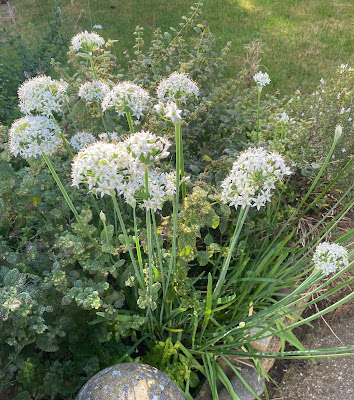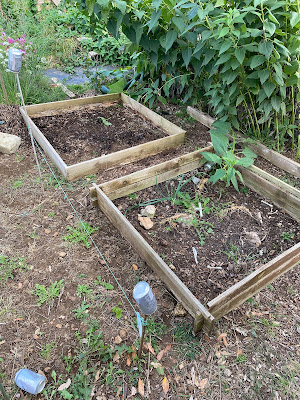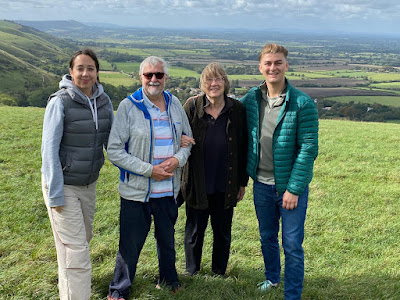Life on The Weald
and other distractions - September 2023
 |
| September - a proliferation of plums |
1 September
September marks the beginning of the meteorological autumn. The 2023-24 storms season also started officially on 1 September which means there is a new set of names agreed in collaboration with the UK Met Office, Ireland's Met Eireann and the Royal Netherlands Meteorological Institute. Together they issued a warning of the coming of Storm Agnes. Although Agnes is not expected until the end of the month, September began with a stormy Friday with strong winds and very heavy rainfall.
3 September
The heavy rain had all gone by Sunday and, apart from a misty morning, it was a glorious sunny day, but not one that I would be spending at the allotment as I was off to London for the Big Half. It was like a pleasant summer's day for me but I fear a little too hot for comfort for the runners in the Half Marathon starting at Tower Bridge and finishing at the Cutty Sark in Greenwich.
Not only did I get to see the race but took the opportunity to meet up with my granddaughter, Tilly, who had a friend running that day.
 |
Spending time with Tilly aboard the Cutty Sark
|
It was a rather special occasion as this was the last time that Mo Farah would be running competitively in London (his last professional race would be a few weeks later in the Great North Run). It was, perhaps, a disappointing result for Mo, the defending champion, as he finished 4th, in 1 hour 2 minutes 43 seconds, 95 seconds behind the winner. It was, however, still a remarkable run as Mo was not well on the day and probably would not have run had it not been his last race. He had a great reception from the crowd for whom he has given so much entertainment, excitement and inspiration over the years.
 |
| Mo comes home fourth! |
And in typical Mo fashion, he was soon back on the course, saluting later finishers offering encouragement and a high-five.
 |
| Mo cheers on later runners |
It was a great day for the legendary David Weir who won the Men's Wheelchair in a a nail-biting finish in 47 minutes 26 seconds, just 1 second ahead of Danny Sidbury and 4 seconds ahead of John Boy Smith.
 |
| David Weir wins the Men's Wheelchair |
There was a great run for Calli Thackery who won the Elite Women's race in 1 hour 9 minutes and 15 seconds, 3 minutes ahead of Lily Partridge who came 5th. There was more excitement in the Women's Wheelchair event as Samantha Kinghorn and Eden Rainbow Cooper raced side by side to the finish line with Samantha winning but with the same time on the clock as Eden, 52 minutes 5 seconds!
4-10 September
Following the weekend we had a continued period of very hot weather - on Thursday 7th, the UK record was broken for the number of consecutive days in September reaching 30C. The previous record was 3 days - in 1898, 1906, 1911 and 2016. 7 September was also the hottest day of the year! This was not to be expected in September.
And it didn't stop there! The 4 day record did not last long as there were 7 consecutive days up to 10 September where a temperature above 30C was recorded in the UK.
But before we start celebrating this glorious weather, it is undoubtedly human-induced climate change that causes heatwaves to be more frequent, more intense and last longer. This is NOT good news for the environment, our eco-systems or future generations.
It is a time of year, however, to relax a little and enjoy the fruits of our labour. We have an abundance of squashes and we enjoyed some Patty pan stuffed with ricotta and nuts, accompanied by our freshly lifted new potatoes and French beans,
 |
| Roast stuffed Patty pan squash |
 |
| Squash with potatoes and beans, all from the plot |
We also have a proliferate supply of plums!
In the garden at home we had a new visitor - a colourful Jay
 |
| A Jay comes to visit |
Last month I had cleared the pond of couch grass that had invaded. This month one of our neighbours had divided her Irises and had some to spare which we have now planted in the pond on the plot. I was pleased to see that the damselflies were still around and when pulling up some couch grass near the pond was pleased to see a large frog.
We are now regularly harvesting squashes, courgettes and cucumbers - and of course, plums!
 |
| 8 September - Patty pan, cucumbers and courgette |
We also have a surplus of apples and, largely based on a Mary Berry recipe, are making apple cake at least weekly. The rest of the apples are finding their way into other dishes or joining the plums in the freezer.
 |
| 9 September - Apple cake |
 |
| 9 September - Apple cake |
15 SeptemberOur Fox still makes a regular appearance every day around 6pm.
 |
| 15 September |
.jpg) |
| 15 September |
16 SeptemberWe had intended to go to London on Sunday to watch the Serpentine Swim but due to algae growth on the days before the swim a number of swimmers had deferred their entry to next year, including those we had been going to support. We could have taken the opportunity to go to the allotment but instead decided on an alternative day out involving water with a trip to Chichester and a boat-ride on the harbour. It was another idyllic sunny day. Surely this cannot last.
 |
| 16 September - Bosham, Chichester |
17-20 September
On Monday there was a sudden change in the weather with heavy rain in the afternoon and evening. On 18 September there were thunderstorms and strong gusty winds with heavy rain in the morning, but followed by a bright sunny afternoon with the temperature in the twenties. it was shortlived as thunderstorms returned overnight and the following two days were wild, wet and windy.
At home the garlic chives took a bit of a battering; but before the wild winds arrived they had been in full flower, attracting bees. Not only do they attract bees, they are a useful culinary herb and the flowers are beautiful.
 |
| Garlic chives |
 |
| Garlic chives in full flower |
There was good news in the garden. Some of the later planted Marmande tomatoes had escaped the attention of the snails and were ripening nicely under a watchful eye.
 |
18 September - Marmande tomato
|
 |
| 18 September - Marmande tomato |
21 SeptemberI was reminded by Facebook what the plot had looked like seven years earlier when we took it on.
.JPG) |
| Plot 247: 21 September 2016 |
23 September
This is how it looked today
 |
| Plot 247: 23 September 2023 |
At home our spindle bush produced its first berries.
 |
| 23 September - Spindle tree (Euonymus) |
And on the allotment, I harvested a ripe tromboncino!
 |
| 23 September - we have tromboncino |
24 SeptemberWe have more, and bigger tromboncinos to come. It's often a difficult decision when to harvest them - when they are young and green and can be used as courgettes or ripe and hardening off when they are more akin to a butternut squash? Luckily we have enough to do both.
 |
| Tromboncino |
 |
Tromboncino
|
Perhaps late in the day but we are still harvesting second early potatoes (Nicola & Charlotte) |
| 2nd Early potatoes |
Some of our red cabbage had been badly affected by slugs and snails and looked rather nasty on the outside but, after peeling away the outer leaves, there was wholesome cabbage within. Another use was found for our apples - we added some to the red cabbage, a little cyder vinegar, butter and some caraway seeds - and dined on braised red cabbage - It's beginning to feel a lot like Christmas!
 |
| braised red cabbage with apple and caraway |
25 SeptemberWho needs a watch? Its 6pm and who should arrive for dinner? Our fox is looking a lot better but we are still providing some food - laced with a lot of garlic to deter the mange; but as winter approaches and the nights draw in we are less likely to be around at dusk so surviving the winter might not be easy.
 |
| 6pm 25 September |
Our sitting area by the pond had become somewhat overgrown - it was meant to be a grassed area but is just a patch of weeds - so I spent a little time with the strimmer just to temporarily tidy up.
 |
| our summer sitting area |
One of our raised beds on the western side had become invaded by raspberries so, despite my conversion to "no-dig" gardening, I removed the frame, got out my fork and attempted to dig out some of the invading raspberries. I relocated the frame to the eastern side near the tromboncinos, where potatoes had been growing this year and will create a new no-dig bed for onions or garlic. In the old bed there was still a spinach plant which I carefully left whilst digging out raspberry canes.
 |
| The old bed at the rear |
 |
| the re-sited frame at the rear |
I have laid cardboard where the potatoes had been growing, ready for covering with a layer of compost/manure for the autumn/winter ready for planting in the spring.
 |
| Cardboard laid where the potatoes had grown |
27 September
I harvested the Borlotti beans. There were not as many as previous years, but we have only just finished the 2021 crop and haven't even started on 2022 yet!
 |
| Borlotti beans |
30 September
More distractions as we received a visit from my grandson, Felix and his partner. It was a fine sunny day so we paid a visit to Devil's Dyke. Although it was fine when we set out it soon clouded over and the temperature dropped suddenly. Perhaps this is a taste of things to come next month!
 |
| 30 September - Fairies Wood |
 |
| 30 September - Devil's Dyke |
John Austin
Hove, September 2023



.jpg)


.JPG)




















































